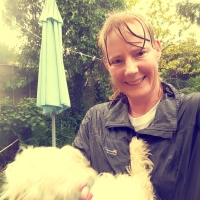An article from The Guardian, on Sunday 21 September 2014 by Daloni Carlisle
Womb cancer is the fourth most common cancer in women, yet there is very little awareness about it. One woman who was diagnosed with the disease last year explains the symptoms and treatment options
You would be hard-pressed to slip a cigarette paper between my half-sister and me. Both aged about 50, both a healthy weight and both pretty fit. Last winter our periods went a bit haywire, and we each reluctantly approached our GPs with questions about the menopause and fibroids. My half-sister needed a D&C (a minor surgical procedure to remove tissue from the lining of the womb). I was diagnosed with locally advanced cancer of the womb.
Now, I am fairly well informed about health matters; I write about them for a living. Yet I had never heard of womb cancer, let alone that it is the fourth most common cancer in women (behind breast, lung and bowel), killing nearly 2,000 women in 2011. That can’t be because the British public is prudish about women’s cancers. Ovarian and cervical cancer are constantly in the news. We are awash (and quite rightly) with pink ribbons for breast cancer. But of womb cancer there is nary a mention.
Professor Martin Widschwendter, the head of the department of women’s cancer at University College London – and medical adviser to the women’s cancer charity the Eve Appeal – agrees. “Of all the gynaecological cancers, endometrial cancer gains the least attention,” he says. One reason might be that it affects mostly older, overweight women. The main symptom is unusual menstrual bleeding. As post-menopausal women do not expect to bleed and there are very few reasons why they should do so, it is usually picked up early and often cured. Often a hysterectomy is enough, although some women also have chemotherapy or radiotherapy.
Without wishing to downplay these women’s experiences – there is no sense in which a cancer diagnosis and a hysterectomy at any age is fun – there is a darker side to womb cancer. While more than 90% of the 8,500 womb cancers diagnosed annually in the UK are the hormone-related adenocarcinomas (tumours) typically occurring in older, overweight women, there is also a group of rarer cancers that can affect any woman at any age.
These cancers are aggressive; they are often diagnosed late because their symptoms mimic other, benign gynaecological conditions; they are often resistant to chemotherapy; and, for young women, bring with them hard choices about loss of fertility. Nicole Olan-George was just 20 when she was diagnosed with a rare form of womb cancer in 2012. She was pregnant at the time and desperate for more children, so decided not to have a hysterectomy and opted for chemotherapy and radiotherapy. Two years later, her cancer has returned. She is still declining a hysterectomy as she wants more children.
“I know the chances of curing the cancer without surgery are lower, but I have to try,” she says. In August, she started her second course of chemotherapy with a toddler in tow.
Late diagnosis often proves lethal. Fewer than half the women in whom the cancer has spread beyond the womb and into the pelvis will live beyond five years. When the cancer has gone beyond the pelvis into the lungs or other organs, fewer than one in five will live longer than five years. So it is not surprising that women diagnosed late rake over whether there was something – anything – they could have done to get an earlier diagnosis.
Sally Kershaw, who was in her 50s when she was diagnosed with one of the rarer cancers, is among them. Her cancer was so advanced that she has been left with an inoperable tumour that has proven resistant to chemotherapy. Like me, she had experienced unusual and heavy bleeding and assumed it was related to her impending menopause. She had looked up her symptoms on the NHS Choices website, where she found this reassuring advice: ”The first symptom [of menopause] is usually a change in the pattern of your monthly periods.” So she delayed her visiting her GP.
“My cancer could have been caught earlier if I had been alerted about spotting between periods, heavy periods and watery blood between periods as the main symptoms of womb cancer,” she says. But when she asked NHS Choices whether there should be mention of womb cancer on the menopause pages, she received the following reply: “The problem with adding a warning about womb cancer to the menopause pages is that it may cause unnecessary panic.”
And this, says Widschwendter, is the nub of the problem. Womb cancer in women as young as Olan-George is extremely rare; it is slightly more common in women of Kershaw’s age. “It is about numbers,” he concedes. “If you had 1,000 women presenting with some sort of menstrual abnormality, you would need to do a huge amount of unnecessary diagnostic testing to pick up one case of cancer in a woman in her 20s.”
But it is still a problem, says Dr Alexandra Taylor, a consultant in clinical oncology at the Royal Marsden hospital. “We are very keen that there should be more awareness. Womb cancer is increasing in incidence and will continue to do so as the population ages and body mass index increases. Lack of awareness also means that there is little push for new treatments, early diagnostic testing or research to understand more about the rarer cancers.”
Where breast cancer has Kylie Minogue and Angelina Jolie raising the profile and cervical cancer had Jade Goody, there is no one standing up for womb cancer. “There is not even a charity dedicated to it,” says Taylor. The research that is under way has focused on optimal treatment pathways – more and more hysterectomies for womb cancer are done by keyhole surgery, which has fewer complications. Meanwhile, Widschwendter’s team is looking at the genetics surrounding adenocarcinoma and whether this can be translated into non-invasive diagnostic testing for women with post-menopausal bleeding.
As I prepare to undergo radiotherapy, what can I say to women with unusual bleeding? It probably isn’t cancer, but it might be. Best get it checked out.
• More information on statistics at Cancer Research UK; Womb Cancer Support UK can be contacted via Facebook; Macmillan Cancer Support runs an online support network for women affected by womb cancer.
Good luck Daloni xxx














Not enough is talked about Women’s cancer. I had a good friend and neighbour who was treated for gallstones for nine months before it was realised (by a locum doctor) that she had ovarian cancer, by that stage it was into the large intestine and she needed major surgery, The fact that her only sister had died from the same condition, a few years earlier, was totally ignored or missed by her family doctor.
LikeLike
It’s so worrying when things like that happen. I think we all assume with serious illness that we will have plenty of warning signs, but unfortunately with Cancer it is often invisible until it is too late. Did your friend recover? It must be awful to have to make the decision to have your intestine removed.
LikeLike
Barbara, Liz’s illness overlapped Jack’s, she limped along for seven years in and out of remission. Regularly I cared for Jack’s needs and then went across to bed-bath or cream her body. When the locum saw her, he had her seen by a Consultant within two days and surgery was performed two days later. There was no time to think – “Will I, won’t I” the surgery was to save her life.
LikeLike
I guess so, but I am still not sure I would do it, although in her situation I doubt as you say that she had much time to think! The problem is unfortunately when cancer has started spreading it continues to do so, and I would almost prefer to have a slightly shorter life without all that surgery, than a slightly longer one with a poorer life quality.
I think its different if the primary cancer is in the bowel or stomach, then of course I would have the operation, but when it has spread from somewhere else I would not expect the prognosis to be that good.
I have witnessed a lot of people opting to have surgery and treatment and a lot refusing it. Peter’s mum had an operation to remove a tumour, but when they told her that the cancer had spread she refused to have any more treatment. Also she didn’t tell any of us that the cancer had spread, even in her last days she told us that the excruciating pain she was in was because she thought she had broken her hip. She was a very stubborn woman! I used not to be able to understand why somebody would refuse treatment, but having seen how she lived, and how she enjoyed life to the very end I understand it more now.
LikeLike
I had plenty of time to think this one out last winter when I was off the road. Was it my heart that caused all the blackouts, or was it something in my head… a clot or tumour? I decided if it was the latter, I would not go the treatment road. I have enough problems with medication and once again it was medication that caused the blackouts. life is good again as my visits to Dublin have proved.
LikeLike
Very glad it was the medication & something fixable, although it would have been better all round if you hadn’t had to go through those months of worrying & not being able to drive!
LikeLike
It’s true Barbara, not enough is known about this cancer … because it’s not talked about.
I suffered with cancer of the uterus in my early thirties and had to have a radical hysterectomy. It was a nightmare. There was no one to talk to, no group to share with.
Thanks for sharing, for making people aware of the issue.
blessings ~ maxi
LikeLike
It’s shocking what Daloni wrote in this article; “The problem with adding a warning about womb cancer to the menopause pages is that it may cause unnecessary panic.”
There has to be a way to make testing more cost effective so that everyone who is worried can be checked, rather than avoiding the issue and ignoring the small percentage who will not survive because of late diagnosis.
Very glad you recovered from your cancer despite the horrible experience Maxi ❤ xxx
LikeLike